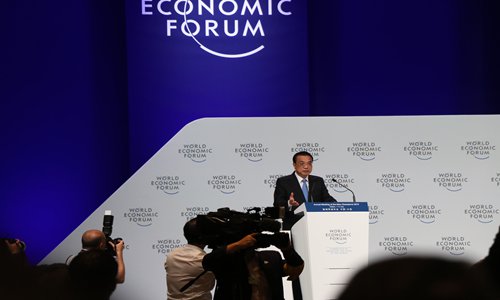Davos sends positive signal to capital markets

Chinese Premier Li Keqiang delivers his keynote address at the World Economic Forum's Summer Davos in Dalian on Tuesday. Photo: Li Qiaoyi/GT
China will scrap foreign shareholding limitations in its financial sector in 2020, a year ahead of schedule, Chinese Premier Li Keqiang said on Tuesday, giving fresh impetus to foreign investors eager to capitalize on the world's second-largest economy that has opened its door even wider to the outside world.
China will also ease ownership limits for foreign investors in the auto sector and encourage foreign investments in manufacturing, while reducing its negative list for foreign investments, Li said in a keynote speech at the Annual Meeting of the New Champions 2019, also known as Summer Davos in Dalian, Northeast China's Liaoning Province.
The nation eyes openness, transparency and predictability in its foreign investment environment, he said.
The opening-up pledge apparently speaks volumes for the nation's drive toward globalization despite trade woes.
The world has benefited from globalization, the Premier stated, noting that China supports WTO reforms and adheres to free trade.
China has been under great pressure and undergone travails amid efforts to push for globalization, he said, reiterating the nation's steadfast push for continued opening-up.

Participants gather at the World Economic Forum's Summer Davos in Dalian on Tuesday Photo: Li Qiaoyi/GT
His remarks were warmly received by forum participants. Seventy percent of this year's forum participants come from outside China, and the US comes only after China in the number of attendees.
"It was a very positive speech, it indicated China's strong determination to open up and reform. It included a number of specific promises, which is very encouraging. We look forward to seeing these promises fulfilled. If we do, I am sure we will see an increase in foreign business activity in China," Timothy Stratford, chairman of the American Chamber of Commerce in China and a former assistant US Trade Representative, told the Global Times on Tuesday.
As Andrew Alspach of the UN Office for the Coordination of Humanitarian Affairs in New York put it, "'We're a part of the global economy' were words cited multiple times in the premier's speech. And to open up these kinds of markets and considering that we're a part of something that is bigger than just one nation, it's definitely an area that benefits the world."
"The financial services sectors have a lot more to gain by having more specialty foreign companies, more exchange and more people coming in that adds vibrancy to the sector," Joe Ngai, managing partner, McKinsey China Region, told the Global Times on Tuesday.
Li also vowed to enhance intellectual property rights (IPR) protection and create a market environment that treats all business ownership fairly.
Bigger tax and fee cuts were also a highlight of his speech. "When I met with businesses executives yesterday, they felt that bigger tax and fee cuts are the most efficient measures they have seen," the Premier said, stressing that the government will honor all tax cut commitments. And instead of being spent on employee salaries and welfare, an amount of money thanks to the tax cuts has been invested in R&D, the Premier said.
It's encouraging that the business community, rooting for the Chinese economy, is now considering a greater commitment to the market.
"We actually bring startups from Switzerland to China, so to have this message of a strong IPR and also on the investment side in a structured way is very beneficial," said Felix Moesner, CEO of the Science Consul of the Consulate General of Switzerland in Shanghai.
"We really feel there are nice progresses going on and I think that the future holds even more opportunities, Moesner told the Global Times.
Fairer environment
The Premier pledged support for the creation of a fairer investment environment and vowed efforts to cut taxes, lower tariffs and remove non-trade barriers - essentially encouraging the flow of capital, talent and goods. "This is fundamental to the viability and stability of the economy. It gives foreign businesses the confidence to up their stakes in the Chinese market," said Yin Zheng, executive vice president of French energy management and automation firm Schneider Electric.
The company's R&D spending in the Chinese market would grow by 50 percent in 2017-2021, according to Yin, also president of Schneider Electric China.
Aside from that, China's growth woes appear to have been largely defused, despite the nation's trade tensions with the US. Official data showed that the economy expanded 6.4 percent year-on-year in the first quarter, faster than expected.
"When the Summer Davos began here 13 years ago, who could have imagined that China could develop into a market with 1.3 billion mobile phones?" asked the Premier. He believes this indicates the market's tremendous consumption potential.
In light of the size of the economy, an annual growth rate of around 6 percent is still impressive, and the push for quality growth and the government's pledge to implement a prudent monetary policy clearly indicates the economy's resolve to achieve long-term sustainable growth, Yin told the Global Times.
In the near-term, geographic disparity and uneven distribution between inland and coastal regions, re-skilling of China's vast labor force to equip them to work with machines and educational challenges demand special attention from the Chinese government, Ngai said.
Newspaper headline: Foreign share limitations in financial sector to end in 2020